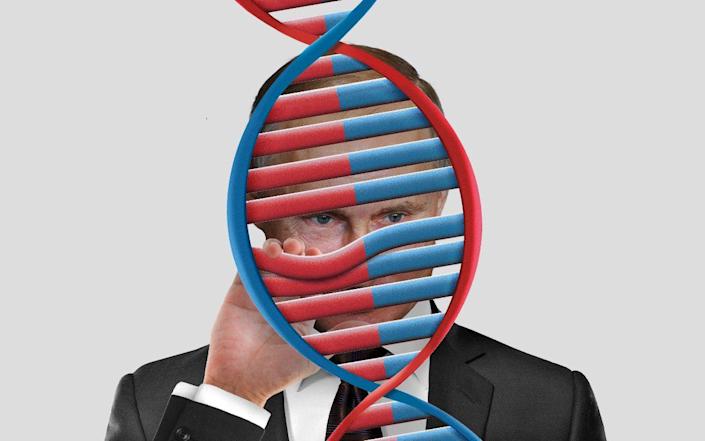
It could have been a scene from the frostiest days of the Cold War. The atmosphere was visibly tense in Moscow last week, when Emmanuel Macron met Vladimir Putin at the Kremlin to discuss the brewing hostility at Ukraine’s border. The two men sat at opposite ends of a comically long white table. They didn’t shake hands.
The meeting had to be physically distanced, both sides say, because of Macron’s refusal to take a Covid-19 PCR test – a requirement for all visitors to the Kremlin. Officially, Paris’s Élysée Palace says the PCR test did not fit with Macron’s busy “diary constraints”. But French diplomatic sources later admitted the decision was, in fact, motivated by fears about what the Russian state might do with his saliva. “We could not accept that they [would] get their hands on the president’s DNA,” a source told the Reuters news agency.
Just over a week later, it was German chancellor Olaf Scholz’s turn to visit the Kremlin. He, too, refused to take a test.
By now, we’re all used to Covid tests; more than 800,000 PCRs are reported every day across the UK, and more than 465 million since the start of the pandemic. Few of us give them much thought. We simply insert the plastic swab into our mouths, twizzle them around our tonsils for a few seconds, then out it comes with less than 1ml of saliva. But within that tiny amount of fluid lies several million human cells; and encased within each of those cells are six billion pairs of DNA. With modern technology, it is possible to sequence almost your entire genome from that spittle, producing a detailed map of your DNA. In the Seventies, this task would have taken years, costing billions of pounds. Now it would take less than a day, and cost about £800.
“I would have refused as well,” says Prof Denise Syndercombe Court, a leading authority on forensic genetics at King’s College London, of Macron and Scholz’s decision. She says she would only take a Covid test “with an accredited organisation… because then you can be relatively assured they wouldn’t do anything inappropriate with the material afterwards.”
But what could the Russians actually do with a Western leader’s DNA?


Experts say the potential nefarious uses range from old-school espionage (like identifying a leader’s genetic vulnerability to illnesses) to the bafflingly futuristic (designing a personalised bioweapon).
Most fears relate to ancestry. Few of us know exactly to whom we are related; in the wrong hands, our DNA could reveal embarrassing skeletons. And Russia has a history. In his book, The Whisperers, about life in the Soviet Union, Orlando Figes chronicles the desperation with which ordinary Russians clung onto shameful family secrets. One woman he interviewed had refused to tell her husband of 20 years that her father had been sent to a labour camp for being a class traitor, in case the information could be used to ruin her career.
Modern Russia has come a long way from those days. But it’s certainly plausible that its security services could analyse a Western leader’s DNA to reveal confidential information – past illegitimate children, perhaps; an ancestor who owned slaves, or collaborated with the Nazis.
“If you’ve got a whole genome, then even if you didn’t know [Macron’s] name, you’d be able to find out who he was,” says Prof Syndercombe Court. The reason this is possible is because millions of people across the world have willingly uploaded their genetic profiles to ancestry websites, through at-home spit test kits, usually in the hope of locating a long-lost relative. This has created an enormous, global database of genetic information.
The majority of people who have uploaded their genetic data are of white, European ancestry; the fact that Macron is also white and European would make it much easier to find any relatives, Prof Syndercombe Court says.
[embedded content]
The potential of high profile DNA has long been appreciated. In the US, Navy stewards are said to gather bedsheets, drinking glasses, and other objects the president might have touched, to prevent his genetic material from falling into the wrong hands, according to Ronald Kessler’s 2009 book, In the President’s Secret Service.
In the pre-Leveson Inquiry days of 2002, St James’s Palace alerted the police after being tipped off about an alleged Fleet Street plot to steal Prince Harry’s hair. His DNA would then have been analysed to address the false rumour that Harry was the biological son of James Hewitt.
A Western leader’s genetic analysis might also reveal potential weaknesses in their health. Sickle cell disease, for example, is the result of just one change in your genome; it would be clear from any quick analysis. The DNA would also reveal the likelihood of that leader developing a host of other illnesses, like Alzheimer’s and heart disease.
Even more disturbingly, some fear that rogue states or terrorists might one day use DNA to create a bioweapon engineered to harm or kill a specific person. It sounds like the stuff of spy fiction; indeed, just such a personalised bioweapon forms a plotline in No Time to Die, the most recent James Bond film. But, as Prof Syndercombe Court points out, we already have chemicals engineered to latch onto a specific genetic sequence, like the luminous compound detectives spray over a crime scene to highlight blood and other human fluids (though she thinks a personalised bioweapon is currently unlikely).
In 2012, Andrew Hessel, a fellow at the Institute for Science, Society, and Policy at the University of Ottawa, co-authored an explosive cover story in The Atlantic in which the magazine claimed the US government was “surreptitiously collecting the DNA of world leaders”. They went on to write that “in the not-too-distant future” genetic hackers might be able to engineer viruses designed to kill just one person – perhaps the US President. It’s not so difficult to imagine. In the field of cancer, they pointed out, research is already “shifting to the development of personalised medicines – designer therapies that can exterminate specific cancerous cells… in a specific person: therapies focused like lasers.”
The claim was controversial; most scientists say that technology is still a long way off. In the early Noughties, scientists were similarly worried about the possibility of an “ethnobomb” – a virus engineered to target the DNA of a particular ethnicity. Those fears have not yet come to pass, and scientists say they are unlikely to do so because ethnicity has a fairly small effect on our genetics.
Still, the French were clearly concerned enough about it to refuse a standard Covid test in the Kremlin – and Germany keen to follow suit. It may leave Boris Johnson with a difficult decision next time he visits Moscow.




